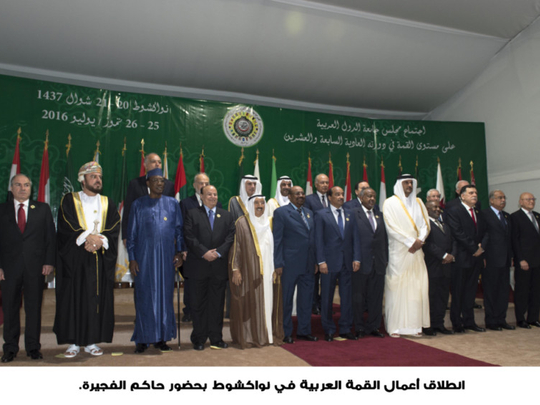
Despite what is being said regarding levels of representation in the recent Arab Summit, the summit was unique from its predecessors as it was held during a time of complex regional and international issues, said UAE’s Al Bayan.
“The Arab Nation has never faced anything like current critical regional and international issues. It seemed like the participating countries were fully in agreement regarding issues discussed during the summit. The summit as a whole took on a rational approach; a reflection of the approach adopted by Mauritania’s in its regional relations. It was indeed the ‘Summit of Hope’, because it simultaneously rescued the march of the Arab League and proved that differences in opinion between Arab nations will not stand in the way of Arab values that bring them together. Their opinions remain undivided when it comes to key Arab Nation issues, like the Palestinian issue, combating all forms of terrorism and Iran’s interventions in the internal affairs of Arab countries.”
The Arab Summit emphasised once again the dangerous challenges and massive responsibilities of every nation in facing current issues, said Qatar’s Al Sharq.
“Current perilous challenges require all Arab nations to exert more efforts in facing them. Qatari Emir Shaikh Tamim Bin Hamad Al Thani was keen on participating in the meeting, despite the fact that the summit coincided with his official visits to Colombia and Argentina. The gesture alone emphasises Shaikh Tamim’s willingness to support and bolster joint Arab work. There was a clear consensus among nations participating in the summit on the dangerous current state of Arab national security. Here’s hoping that the summit ushers in hope and that its outcomes will help strengthen Arab solidarity and support joint Arab work, which will help the Arab Nation realise the aspirations of their peoples and overcome current challenges.”
The summit held in Nouakchott might be a lifeline for Arabs, particularly after their long absence in exerting any influence on recent issues that affected the region, said Egypt’s Al Ahram. “Despite the challenges Arab nations faced in the past few years, Arab summits never forcefully intervened to resolve problems or crises that have now become chronic. The negative impact of these challenges was the fragmentation of states and hope fading among the people in restoring the nation to the state it was prior to 2011. It is crucial that Arabs unify their views in order to resolve their own issues without resorting to help from foreign countries. A very clear example is the Syrian crisis, which was forsaken by Arabs and handed over to Russia and the United States, to the extent that resolving the Syrian crisis can now only be possible through an agreement between US Secretary of State John Kerry and Sergei Lavrov, the Foreign Minister of Russia.”
Bolstering the security and stability of the Arab world, as well as strengthening the Arab identity, were the goals of the Arab Summit, said Saudi Arabia’s Al Yaum. “The summit took place during a critical time for the Arab world. The priority of the Arab countries must be to work on increasing understanding between one another in order to combat terrorism and support Arab and international efforts in eradicating this phenomenon.”




_resources1_16a31069e4e_small.jpg)







